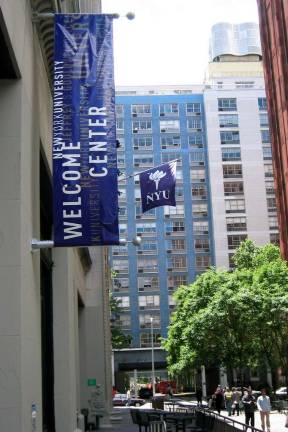Opponents to Approved N.Y.U. Expansion Plan Tossed out of City Hall, Considering Next Step

By Paul Bisceglio "Chin and Quinn did us in!" jeered over 50 opponents to New York University's expansion plan from a balcony overlooking City Council's chamber. "Shame on you!" Greenwich Village residents, community activists and N.Y.U. professors filled the chamber to capacity yesterday to witness the full City Council's final vote to approve hotly debated zoning and map changes that will allow the university to construct four new high-rise buildings over the course of 17 years, 2014 to 2031. The opponents became increasingly vocal as the time to vote neared, and broke into chants just before it. Speaker Christie Quinn asked for silence and warned the opponents that they would be kicked out, but the chants continued, and security escorted the entire balcony out of the building. The proposal passed by a 44-to-1 vote. Prior to the meeting, the Greenwich Village Society for Historic Preservation (GVSHP) commissioned a 32-page [report](http://www.gvshp.org/_gvshp/preservation/nyu/doc/NYUImpacts4-12.pdf) that outlined the negative impacts of the expansion plan, and opponents wrote a [letter](http://www.gvshp.org/_gvshp/preservation/nyu/doc/city-council-sign-on-ltr-07-23-12.pdf) to City Council that expressed the community's dissatisfaction with the proposal. "The NYU expansion plan will turn a residential neighborhood into a company town and subject it to twenty straight years of construction," said GVSHP Executive Director Andrew Berman in a statement. "The Council ignored the grave environmental impacts of this plan and the much better options that had been put forward for NYU to locate new facilities in the Financial District; this is a sad day for democracy in New York City." John Sexton, N.Y.U.'s president, however, said that the approval marked "a great day for N.Y.U. and for New York City," and said that the expansion will provide the city with much-needed construction jobs and university positions. His statement argued that the plan "strikes an important balance: permitting N.Y.U. to maintain academic excellence by meeting our educational- and research-space needs on our existing footprint over the next two decades, while at the same time addressing the concerns of our neighbors on such issues as improving access to open space." The opponents are now considering legal action. "We will be working closely with our partners in the NYU faculty and with our lawyers at Gibson Dunn to pursue every avenue available to us to remedy this tragic wrong which has been imposed upon the people of the City of New York," said Berman.